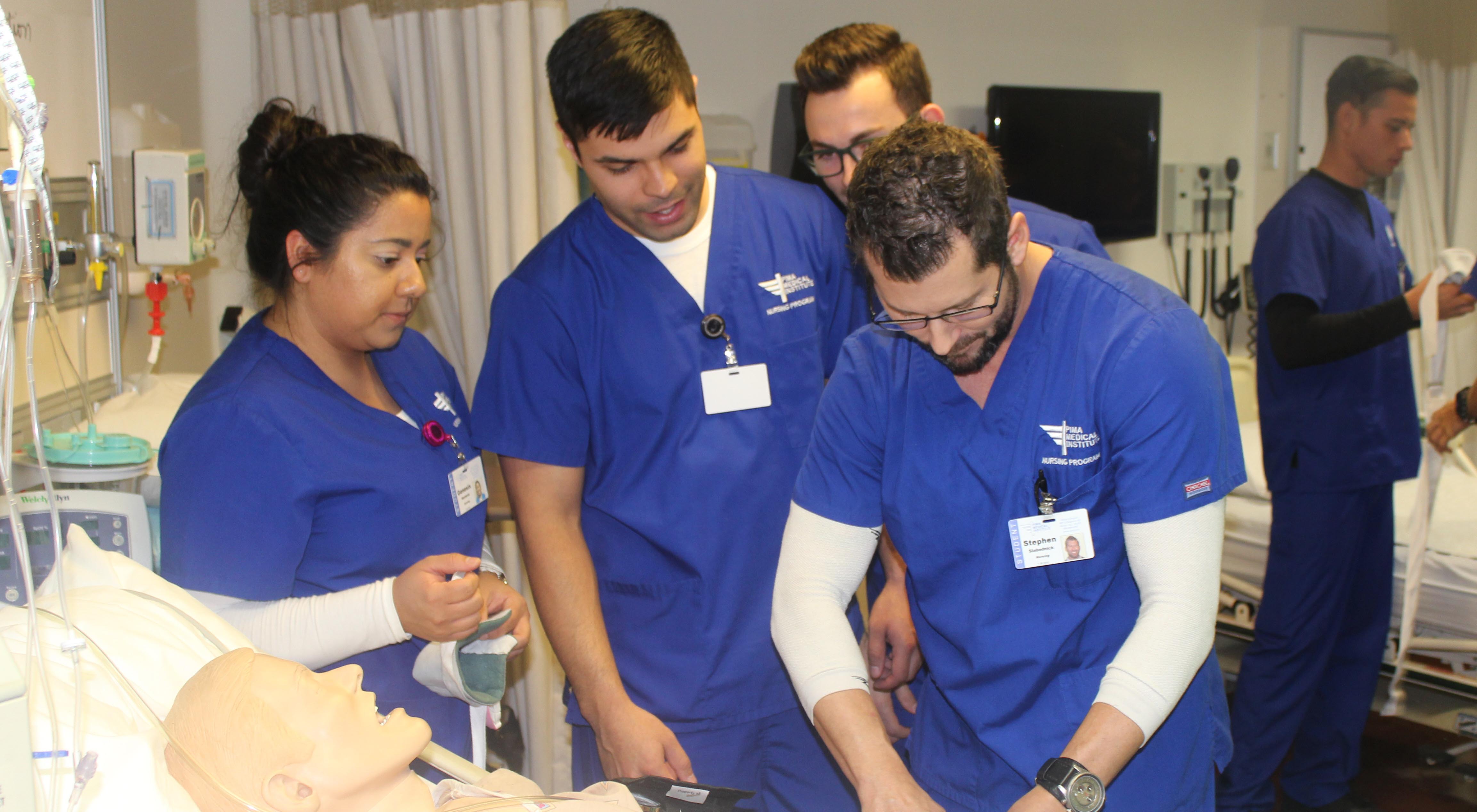The Arizona Board of Nursing just released its 2014 statewide nursing program rankings, placing Pima Medical Institute’s Mesa and Tucson campuses in the top 10 out of 38 programs statewide. The Mesa campus was ranked at number two, placing it only two points below the University of Arizona’s nursing program. The Tucson campus was ranked number nine.
The ranking is based on licensure and graduation rates. The Mesa nursing program’s 2014 National Council Licensure Examination-Registered Nurse (NCLEX-RN) pass rate was 97.14 percent, while the state of Arizona’s overall pass rate was 89.99 percent and the national rate was 81.79 percent. The Mesa campus’ 2014 nursing graduation rate was 89 percent, while the state average was 50 percent. The numbers are a testament to Pima Medical’s dedication to providing top nursing curriculum.
“We couldn’t be more proud of our students’ successes and our faculty’s dedication,” said Pima Medical Institute President and Chief Executive Officer, Fred Freedman. “We attribute these incredible program outcomes to a focused curriculum delivered by an amazing group of nursing professionals to motivated students with an insatiable thirst to learn.”
Pima Medical’s Mesa nursing program has seen success for many years in a row, and it’s attributed to an extremely dedicated faculty, said Mesa campus Director, Kristen Torres.
“It really is due to the passion the faculty and Pima Medical overall has for the students. We choose our faculty members based on their fit with our program’s philosophy and personality,” said Torres. “They may have decades of teaching experience, but if they can’t demonstrate to us that they are in it for the student, no matter what, then they won’t fit well with us.”
Mesa Nursing Program Director Sharon Caves said close student attention is also a large part of the program’s success.
“We spend as much time helping the student outside the classroom as we do in the classroom. For the two years of the program, we are their family, their biggest supporters, and the setter of the highest expectations for them. We refuse to allow them to give up. If they tell us when they apply for the program that they have always wanted to be a nurse, then we are going to do our best to make that happen,” Caves said.
The nursing program’s curriculum has always been rigorous and effective, but recently Pima Medical decided to make a few changes, which has only improved student success further. Over a two-year period, Pima Medical’s faculty researched and implemented strategies to move students from the medical model of memorization to a system of disease prioritization and recognition, data trending and interpretation, critical thinking, clinical reasoning and early recognition of condition changes and needed interventions.
“Essentially, we moved students from a strictly memorization method of learning to a much higher level of thinking, reasoning and judgement in decision making,” Caves said.
“Nationally, new graduates leave the workforce in alarming numbers after six months because they discover that what they learned in school is different than workplace reality—but that’s not the case for our graduates. Eighty percent of our graduates said the clinical experience was of high quality and 90 percent felt they learned the ability to work through complex situations requiring critical thinking,” Caves explained. “Also, employers reported our graduates had the ability to appropriately respond to patient conditions and changes, prioritize patient needs and assignments and had good critical thinking and problem-solving skills.”
Pima Medical’s nursing curriculum upholds six core values, known as the 6-Cs, which students and instructors live by. They include communication (that supports diversity), compassion, competence, commitment (to ethical practice and excellent service), critical reasoning (and evaluation of safety and quality), and complexity (in holism of care and practice).
“We are proud of our core values,” Caves said. “Students are quizzed on these, and we all live and breathe, believe and role model them.”
According to the Arizona Board of Nursing’s report, enrollment in nursing programs throughout Arizona is on the rise. In 2014, total enrollments jumped by 8 percent to 7,400 statewide. Arizona’s increase reflects nursing career predictions published by the U.S. Bureau of Labor Statistics, which states the nursing field will grow 19 percent from 2012 to 2022. The increase is due to a number of factors, including an emphasis on preventative care, the growing rates of chronic conditions, such as diabetes and obesity, and the demand of healthcare services from the baby boomer population as they live longer and more active lives.
Pima Medical Institute offers an associate degree in nursing as well as an online program for registered nurses who want to obtain their bachelor of science in nursing (RN to BSN). The RN to BSN program was just recently introduced.




